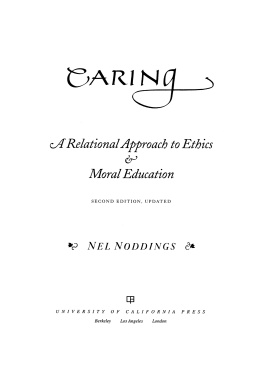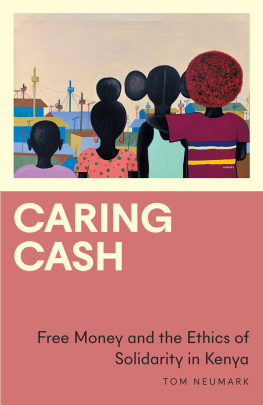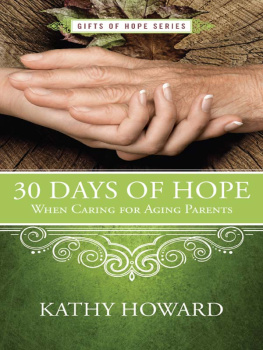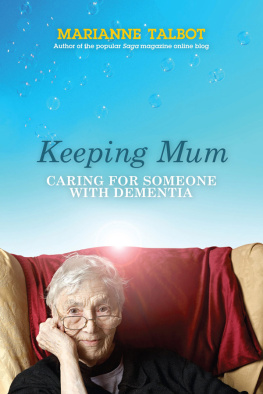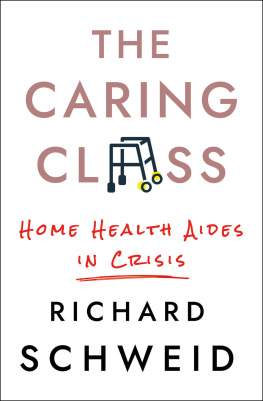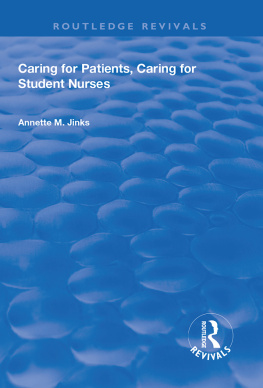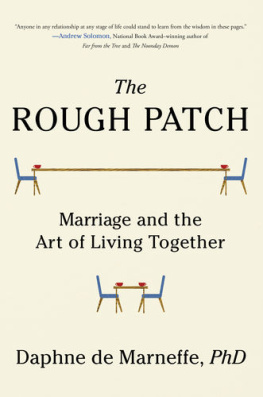The Maternal Factor
The Maternal Factor
Two Paths to Morality
Nel Noddings

UNIVERSITY OF CALIFORNIA PRESS
Berkeley Los Angeles London
University of California Press, one of the most
distinguished university presses in the United States,
enriches lives around the world by advancing scholarship
in the humanities, social sciences, and natural sciences. Its
activities are supported by the UC Press Foundation and
by philanthropic contributions from individuals and
institutions. For more information, visit www.ucpress.edu .
University of California Press
Berkeley and Los Angeles, California
University of California Press, Ltd.
London, England
2010 by The Regents of the University of California
Library of Congress Cataloging-in-Publication Data
Noddings, Nel.
The maternal factor : two paths to morality /
Nel Noddings.
p. cm.
Includes bibliographical references (p. ) and index.
ISBN 978-0-520-26549-3 (cloth : alk. paper)
ISBN 978-0-520-26550-9 (pbk. : alk. paper)
1. Caring. 2. MotherhoodMoral and ethical
aspects. 3. Ethics, Evolutionary. 4. Feminist ethics.
I. Title.
BJ1475.N625 2010
Manufactured in the United States of America
19 18 17 16 15 14 13 12 11 10
10 9 8 7 6 5 4 3 2 1
This book is printed on Cascades Enviro 100, a 100% post
consumer waste, recycled, de-inked fiber. FSC recycled
certified and processed chlorine free. It is acid free,
Ecologo certified, and manufactured by BioGas energy.
CONTENTS
ACKNOWLEDGMENTS
Several people have contributed generously to this work by reading drafts, discussing problems, and suggesting further readings. Virginia Held and Sara Ruddick were interested and enormously helpful while the book was little more than a gleam in my eye, and I have drawn on their work in addition to their valuable feedback.
Harvey Siegel, Marc Bekoff, Jean Watson, and David Glidden provided useful suggestions and much-appreciated encouragement. Conversations with Lynda Stone, Lawrence Blum, Nona Lyons, and Steve Thornton aided my thinking.
I am also indebted to audiences who responded enthusiastically to my initial ideas, among them those at Penn State, Lewis and Clark, University of Hawaii, Seton Hall, Miami University of Ohio, St. Benedicts, the Holistic Education Association, and the Mountain Lake Music Colloquium.
Michael Slote, as both formal and informal reviewer, saved me from a couple of egregious historical errors and, more important, asked the hard questions that had to be answered in the final manuscript. Many, many thanks.
As always, my husband, Jim, deserves thanks (and perhaps a medal) for putting up with my tossing and turning, grumbling, and moments of perhaps unwarranted enthusiasm.
Finally, I want to thank Naomi Schneider, patient and resourceful editor; Marilyn Schwartz, managing editor with a talent for diplomacy; and Mary Ray Worley, copyeditor who did an exemplary job.
INTRODUCTION
Much work is being done today on the evolution of morality. Anthropologists, psychologists, evolution scientists, and philosophers are looking for the roots of altruism, empathy, solidarity, and cooperation. Surprisingly, in seeking these roots, scholars rarely look at female experience. It may well be that one wide and increasingly influential approach to moral lifecare ethicscan be traced to maternal instinct.
I will not argue that an ethic of care evolves in a blindly biological way. Thinking, experimenting, reflecting, analyzing, and conceptualizing are all involved in developing an ethic. As Virginia Held has argued, when we consider naturalizing morality, we should not lose sight of ourselves as moral subjectsas persons who think and make choices, some of which challenge the way we are as biological creatures.science can study moral behavior and experience. It is also naturalistic in its insistence on remaining closely aware of actual human conditions and human nature. But it is not narrowly naturalistic or reductionist. There are elements of human emotion, attachments, and choice that demand a normative orientation, one that may challenge our natural inclinations; care ethics recognizes a moral subject.
We can ask, however, how this moral subject arises from natural beginnings, and we can examine these natural beginnings to locate problems that may beset a normative ethic under construction. For example, the current study of altruism has revealed that altruism most often occurs between entities closely related by bloodlines. But we also know that, in the absence of hostile relations, many human beings respond sympathetically to the pain and needs of strangers. If it is true that we are naturally more inclined to care for our own children than for those of others, how do we prod ourselves to overcome what might be a moral shortcoming, and how do we decide that it is a shortcoming?
In searching female experience for the roots of morality, we should be astonished if thousands of years of confinement to home, family, and small community did not produce evolutionary effects. Among the salutary effects are female sensitivities to the needs of others and inclinations to respond positively to those needs. Among the negative effects may be an acceptance of subordination and a lack of facility with objects, spatial relations, and abstractions connected with the realm of human-made objects. Well have much to say about the acceptance of subordination in what follows. Even to suggest the possibility of the second set of evolutionary effects is to risk condemnation. But to suggest the possibility of positive evolutionary effects, one must also be willing to at least entertain the possibility of negative effects. We must proceed with caution and open minds.
On the positive side, we should consider surveys that show, year after year, that women are, in general, significantly more concerned with social issues than are men. When we say in general, we mean that, if the studies are well done, we may expect comparable results from further studiesthat is, that more women than men will declare interest in matters such as child welfare, poverty, gun control, care of the aged, and compassionate treatment of prisoners. Such generalizations tell us nothing about the next woman or man whom we may meet. We cannot extrapolate from such generalizations to individuals. Similarly, on the negative side, we know that females do not do as well as males on mathematics tests and like measurements of ability in science and engineering. People dispute this conclusion by pointing to the fact that more girls than boys are now taking advanced courses in high school mathematics and getting better grades than boys. More girls also go on to college. But girls still score about thirty-five points lower than boys do on the math SAT. Similarly, girls rarely rank at the highest levels in science competitions, although that picture is changing. In 2007, for the first time, girls won top honors in the Siemens Competition in Math, Science, and Technology.factors operating. In this case, parental genes may have trumped the genes that might predict female/male differences. One could argue, perhaps even more persuasively, that the outstanding female students had the benefit of homes and parents who are scientifically well educated.
It would be quite wonderful if what has long seemed an evolutionary fact turns out to be a mere cultural artifact. The twenty-first century might see a fair share of female mathematical geniuses. But readers will become aware, as the book proceeds, that my interest lies more in the possibility of changing a male evolutionary traitthe tendency to aggression and violence. If we celebrate the success of women becoming more like men in professional life, can we at least speculate on the possibility of men becoming more like women in peacemaking, tenderness, and nurturance?
Next page

